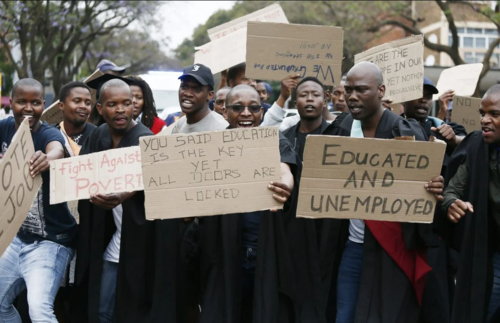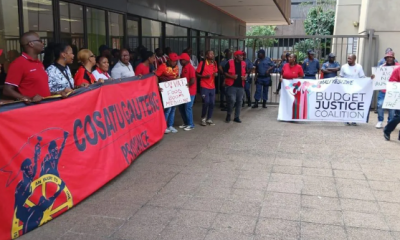Published
3 months agoon
By
zaghrah
South Africa is currently facing an alarming public employment crisis, with unemployment rates at an all-time high, coupled with massive cuts to vital public employment programs. The latest blow came in December 2024 when the Department of Cooperative Governance and Traditional Affairs (Cogta) announced the dismissal of 67,000 Community Works Programme (CWP) workers above the age of 55. These workers, alongside their 450,000 dependants, are now left with little hope of finding employment in an economy suffering from a staggering 41.9% unemployment rate.
This crisis highlights the need for urgent action and a robust response from the government, businesses, and communities. Cosatu and the South African Municipal Workers’ Union (Samwu) have raised concerns about the detrimental impact of these cuts, which further strain an already fragile job market. It is clear that South Africa needs to ramp up public employment, not cut back.
A Crisis of Scarcity in Public Service
Despite the country’s growing population—nearly doubling since 1994—South Africa’s public service has not expanded at a similar pace. Currently, the public sector employs only about 1.2 million people, with approximately 70,000 vacant positions. Critical areas like healthcare and law enforcement are severely understaffed, leading to a decline in service quality.
The South African Police Service (SAPS), for example, has seen a significant reduction in headcount from over 200,000 a decade ago to just 170,000 today. Similarly, the healthcare sector faces a shortage of nurses and doctors, and schools are struggling with overcrowded classrooms. These staffing shortages make it evident that the government’s approach to public employment has not kept up with the country’s needs.
The Case for a Hybrid Approach to Employment Programs
Addressing the public employment crisis requires a hybrid approach—one that provides a safety net for those unlikely to find work and a path to future employment for those who can. Public employment programs should offer real skills, training, and experience that align with the needs of the job market. For instance, digitization work in departments like Home Affairs can equip participants with IT and AI skills, which are increasingly in demand.
However, the effectiveness of these programs has been hindered by corruption, patronage, and underfunded initiatives. Many programs pay below the minimum wage, leaving participants in a vulnerable position. To overcome these challenges, the government must focus on tackling corruption, ensuring fair pay, and creating meaningful job opportunities for workers.
Collaborating with the Private Sector
The private sector must play a vital role in resolving South Africa’s public employment crisis. By supporting local industries, reducing the wage gap, and committing to fair employment practices, businesses can help create jobs and uplift communities. Companies must also collaborate with government-funded skills development programs, such as those provided through the SETAs, to boost productivity and career prospects for South Africans.
The private sector’s commitment to creating a sustainable job market, coupled with government-led reforms, is crucial to overcoming the national unemployment crisis. Moreover, businesses must help reduce retrenchments and focus on hiring young workers, which can significantly alleviate the youth unemployment crisis, currently at a staggering 70%.
A Call to Action: Defeating Unemployment
The unemployment crisis is a ticking time bomb that threatens the country’s stability and growth. As we head into 2025, it’s crucial for all stakeholders—government, businesses, and civil society—to come together and declare war on unemployment. A well-resourced, multi-faceted approach, similar to the country’s response to the Covid-19 pandemic, is necessary to turn the tide.
By investing in public employment, improving service delivery, and creating sustainable job opportunities, South Africa can overcome this crisis. It’s time to act, before the social and economic repercussions of inaction become irreversible.
By tackling this issue head-on and ensuring that public employment programs are revamped and effectively managed, South Africa can create lasting change and a more secure future for its citizens.


South Africa’s Economic Struggles: Navigating Global Turbulence and Domestic Challenges in 2025


How Fake Job Scams Are Exploiting Desperate Job Seekers in Alberton


MKP Slams Major South African Banks for Lack of Transformation and Monopoly Practices


Western Cape Premier Urged to Prioritize Education Amid Protests


COSATU Calls Budget Speech Delay a ‘Blessing in Disguise’ Amid VAT Concerns


ArcelorMittal’s Newcastle Furnace Closure Could Devastate South Africa’s Economy















